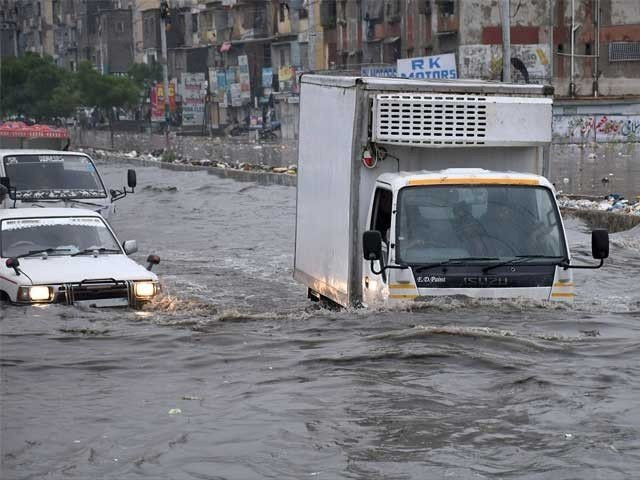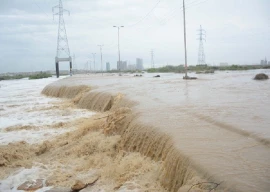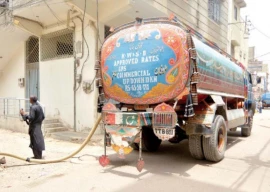
The federal government imposed emergency in the rain and flood-affected areas on the instructions of the Prime Minister Shehbaz Sharif, as the Pakistan Meteorological Department (PMD) warned on Friday of more rains in Sindh and Balochistan in the wake of two system of monsoon currents over the next week.
The prime minister chaired a review meeting regarding the flood situation, and constituted a high-level committee of the National Disaster Management Authority (NDMA) and the Provincial Disaster Management Authorities (PDMAs) to carry out rescue and relief work in the affected areas, effectively.
Climate Change Minister Sherry Rehman warned that more rains were expected in the coming weeks of August, therefore, the federal cabinet had declared a monsoon emergency. “All concerned federal and provincial agencies have been advised to stay on alert and take necessary precautions,” she said.
“According to the Pakistan MET department, the country will experience more rains in the coming week. Islamabad, Kashmir, Punjab, Khyber Pakhtoonkhwa, Balochistan and Sindh will receive heavy rainfall from 6th to 9th of August,” Rehman tweeted.
Read more: Sindh, Balochistan receive over 500% more rain than 30-year average in July
“Furthermore, the areas including Gilgit Baltistan will also experience strong winds and thundershowers from the 10th to 13th of August… In the meantime, all district commissioners and provincial administrations should be mobilized to prevent loss of lives,” she added.
Earlier, the PMD warned of light to moderate rains in various districts of SIndh, including Karachi, from Saturday (today) till August 9, as a fourth system of monsoon currents entered the province. It said that another system would bring heavy rains with thunder between August 11 and 13, causing urban flooding.
“Two monsoon systems will bring rain in various districts of Sindh, including Karachi. There will be light to moderate rain between Saturday, August 6 and August 9, while heavy rains with thunder is expected from August 11 to 13,” the PMD said.
Pakistan’s cabinet has declared a monsoon emergency but now we need to brace for the next round of rain torrents. Starting tomorrow. All provinces and district administrations, NDMA & PDMAs need to act now to take as many preventive measures as possible.
— SenatorSherryRehman (@sherryrehman) August 5, 2022
According to the Met Office, the first system would enter from the Arabian Sea, while the second would come from the Bay of Bengal. There were fears of urban flooding due to heavy, rains resulting from the second system, it added.
The second monsoon systems would bring heavy rains in various districts of Sindh, including Badin, Thatth, Sajawal, Tando Muhammad Khan, Tando Allahyar, Dadu, Jamshoro and Qamber-Shahdad Kot. During August 11-13 period heavy rains might also occur in various districts of Balochistan.
“There is a risk of flooding in the rain-fed and local rivers and streams in Qila Saifullah, Loralai, Barkhan, Kohlu, Musakhel, Shirani, Sibi, Bolan, Kalat, Khuzdar, Lasbela, Awaran, Turbat, Panjgur, Pasni, Jiwani, and Ormara and Gwadar,” the PMD said.
“All concerned institutions are advised to be on alert and take necessary precautionary measures during this time,” the PMD added. In the light of rain forecast, the Civil Aviation Authority (CAA) issued orders for advance measures at the Karachi Airport.
The climate change minister said that the levels of Chenab, Jhelum and Ravi rivers were likely to rise in the wake of fresh spell of rains, posing a risk of flash flooding in local rivers and nallahs in majority of the cities and towns.
“Travelers and tourists should travel in consideration of the weather conditions and be more careful while travelling especially in the northern areas and Kashmir as rainfall may trigger landslides there as well in hilly areas during these days,” the minster added.
Also read: Flash floods kill 550 in Pakistan in heaviest rains in decades
Meanwhile, chairing the review meeting, the prime minister, who already had visited various flood-affected areas, received a briefing the issues related to relief and rescue. He stressed the need for developing a medium to long term strategy in view of climate change in the country.
The prime minister constituted a high-level committee, comprising federal ministers Ahsan Iqbal, Maulana Asad Mehmood, Abdul Wasay, Murtaza Javed Abbasi, Adviser for Kashmir and Gilgit-Baltistan Qamar Zaman Kaira, the NDMA chairman and the communications secretary.
The committee should hold its meeting immediately and submit its suggestions to improve coordination between federal and provincial institutions, Shehbaz instructed. He asked the provincial governments to send reports to the federal government so that the flood damages could be estimated as soon as possible.

1719315628-0/BeFunky-collage-(8)1719315628-0-405x300.webp)


1731329418-0/BeFunky-collage-(39)1731329418-0-165x106.webp)





1731771315-0/images-(3)1731771315-0-270x192.webp)










COMMENTS
Comments are moderated and generally will be posted if they are on-topic and not abusive.
For more information, please see our Comments FAQ